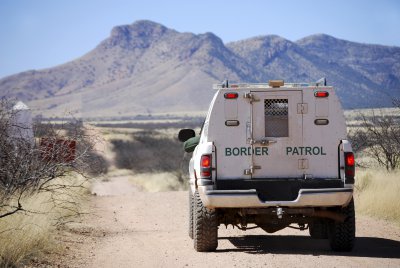
At first I could not believe my eyes when I saw this headline in the Los Angeles Times:
Government paying private firm $297 million to help hire 5,000 Border Patrol Agents
I understand that the Border Patrol has a major turnover problem; the jobs are demanding, yet often boring. They are sometimes dangerous; they involve a lot of night work. Routinely, new recruits are stationed at the southern border, in places far from their homes and families. Some people may not like the desert, which is where much of the work is done.
Further, other government agencies value agents with Border Patrol experience, and often hire them away from the Patrol.
Earlier in my career I spent many weeks on the border, talking with the agents and their bosses, in a series of locations from Brownsville to San Diego, including such unlikely ones as Presidio, Texas, once bombarded by Pancho Villa's artillery, and Los Ebanos, Texas, where there is no bridge over the Rio Grande, but, when I was there, there was a hand-drawn ferry boat. I have a first-hand sense of the hardships faced by the agents. (I was not in the Border Patrol; I was doing research on immigration control.)
But spending nearly a third of a billion dollars on a consulting firm to help hire agents? That seems more than a bit excessive.
Let's look at this from three different angles, the proposed use of the $297 million; a test used in the Border Patrol recruiting process; and the private agency that is going to get the money.
Money. If you want to hire people for a demanding job you need to pay them well enough to get them and keep them. The Border Patrol has trouble with both ends of that equation. Starting salaries for recruits depending on their prior experience are, at three different levels: GL-5, $38,619; GL-7, $43,964; and GL-9, $49,029. After about nine months, if the probationary period works out for the new agents, the recruits move up to the next grade, giving them salaries that are roughly $5,000-6,000 higher than where they started.
This salary schedule, however, does not seem to work, given the current rate of turnover.
Why not give each of the some 20,000 agents a raise of $100 a week, or $5,000 a year, for a total cost of $100 million a year, instead of paying a consulting/recruiting firm three times that much? Wouldn't that be a better investment?
The Test. One of the reasons why the Border Patrol has trouble recruiting, if not retaining workers, is the lie detector test it uses. The Los Angeles Times article indicates — as I have known for some time — that 65 percent of the candidates flunk the test.
I simply cannot believe that two-thirds of the candidates for law-enforcement jobs would fail a realistic lie detector test. These tests are not being administered on a population within a prison. I realize that some of the Borderland cartels seek to infiltrate the Border Patrol, and that all applicants for these jobs are not necessarily boy scouts, but the failure rate of that test suggests that the test, itself, is faulty and should be replaced.
You don't need a multi-hundred-million-dollar contract to figure that out.
The Consulting Firm. And who got that contract to help the Department of Homeland Security to recruit Americans for this work? It was the mega firm Accenture, which concentrates on the IT field.
Accenture is so good at recruiting Americans for its own staff that, during Fiscal Year 2017, it filed 6,614 applications for H-1B foreign workers, saying, in effect, "Gee, we can't find Americans to work for us."
According to the Myvisajobs.com website, that uses public records of these filings, Accenture filed for 8,519 H-1Bs the year before.
Do you hire the very last runner to straggle across the finish line in a marathon to be the university's new track coach? Probably not.
But that's a metaphor from the real world.
Historical footnote: I once played a small, but useful role in shaping the Border Patrol recruitment process. This was 50 years ago and I was working for the Johnson administration. (My boss, Mark Krikorian, helpfully points out, from time to time, that these were the days of Lyndon — not Andrew — Johnson.) I was staff director of the Cabinet Committee on Mexican-American Affairs, an in-house advocacy organization that was at the outer edge of LBJ's White House. (The agency no longer exists.)
At one point I asked each of the major departments and agencies to come up with a step forward for the community that: A) the White House could publicize, and B) that could be done without the expenditure of a lot of money or the change of a law or regulation. At first I did not understand the offering of the legacy Immigration and Naturalization Service — they would lower the height requirement for Border Patrol recruits from five feet seven inches to five feet six. Then I realized that the new height requirement would allow the hiring of many more Mexican-American agents. A quick review of current hiring requirements for the Border Patrol shows no height requirements of any kind.
